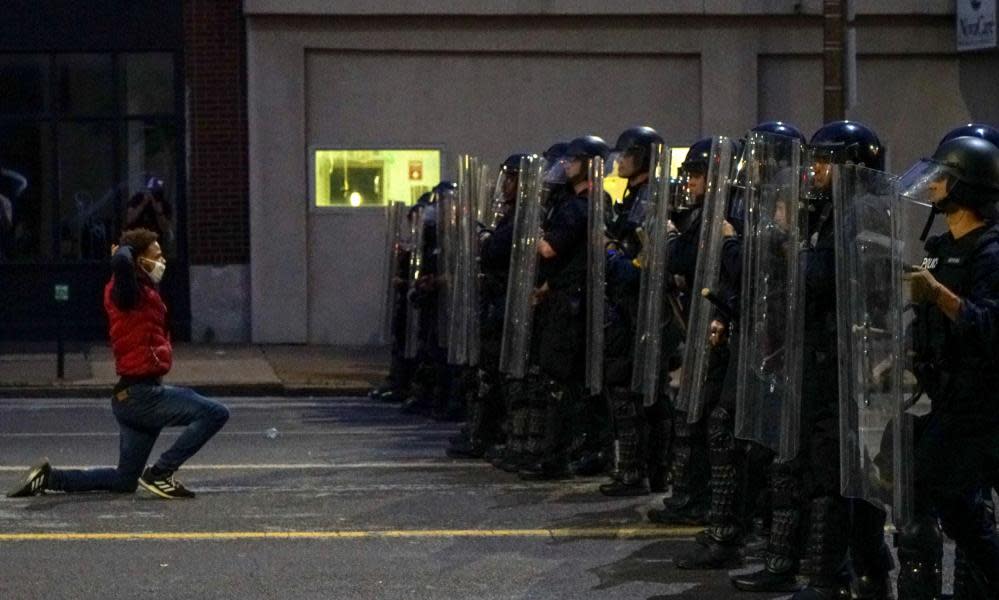If you’re surprised by how the police are acting, you don’t understand US history

Amid worldwide protests against the police killing of George Floyd, activists around the US have raised demands for specific policy measures, such as defunding the police. Justifying these demands are the images emerging from the protests, with police officers ramming protesters in vehicles, indiscriminately attacking protesters with pepper spray and exerting excessive force. Local and state policing budgets have nearly tripled since 1977, despite declining crime rates. Even people unfamiliar with the police and prison abolitionist movement are starting, rightly, to envision that public spending could be used in more socially responsible ways.
But beyond the fiscal argument is an ethical one: policing in America cannot be reformed because it is designed for violence. The oppression is a feature, not a bug.
Related: The George Floyd protests – and riots – are a rebellion against an unjust system | Philip McHarris
That seems like a radical sentiment only because policing is so normalized in American culture, with depictions in popular media ranging from hapless, donut-chugging dopes to tough, crime-fighting heroes. We even have a baseball team named after a police organization – the Texas Rangers.
But it’s time to look beyond the romanticization of American police and get real. Just as America glorifies the military and Wall Street, and some Americans whitewash the confederate flag and plantation homes, the history of policing is steeped in blood. In fact, the Texas Rangers are named after a group of white men of the same name who slaughtered Comanche Indians in 1841 to steal indigenous territory and expand the frontier westward. The Rangers are considered the first state police organization.

Likewise, as black people fought for their freedom from slavery by escaping north, slave patrols were established to bring us back to captivity. Many researchers consider slave patrols a direct “forerunner of modern American law enforcement”.
In northern “free” states, police precincts developed in emerging industrial cities to control what economic elites referred to as “rioting”, which was “the only effective political strategy available to exploited workers”. But, as described in the text Community Policing, this “rioting” was:
actually a primitive form of what would become union strikes against employers, [and] [t]he modern police force not only provided an organized, centralized body of men (and they were all male) legally authorized to use force to maintain order, it also provided the illusion that this order was being maintained under the rule of law, not at the whim of those with economic power.
In other words, police were never created to protect and serve the masses, and our legislative and judicial systems – from Congress to the courts to prosecutors – have made this clear. Congress’s 1850 Fugitive Slave Act, for instance, incentivized law enforcement officials to capture Africans suspected of running away from slavery, paying officials more money to return them to slave owners than to free them.
Instead of expanding the American political project to embrace black people as free citizens, our institutions made caveats to exclude them from the country’s founding principles. Historically, most black people were not considered human, let alone citizens worthy of police or constitution protections. We were property. Even free blacks were, at best, second-class citizens whose status could be demoted at any white person’s whims and who fundamentally had “no rights which the white man was bound to respect”, as the supreme court affirmed in 1856.
Modern court rulings have steadily eroded civil liberties to give police more power and permit racially discriminatory policing, convictions and sentencing. This entrenched history of violent white supremacy is a lot to attempt to reform. So just as 19th-century abolitionists set the terms of their fight beyond incremental improvements to slavery, abolitionists today assert that policing and incarceration must move past modest proposals that fundamentally maintain the system.
The billions of dollars that governments spend on increasingly militarized police can be better used to address the underlying socioeconomic conditions that contribute to police encounters. We should divert resources towards investments in mental health, public education, drug prevention programs, homelessness prevention, community-centered crime prevention and jobs development.
The immediate aftermath of George Floyd’s killing felt like another police encounter that would lead to yet another viral hashtag with little police reform. But the work of abolitionists has set the bar even higher. We should move past calls for criminal justice reform and instead make demands for freedom.
Malaika Jabali is a writer, attorney and activist whose first short film, Left Out, examines the economic crisis facing black midwesterners
On Tuesday 9 June at 7pm BST (2pm EDT) the Guardian is holding a live-streamed event about the meaning of George Floyd’s killing, featuring Guardian journalists including US southern bureau chief Oliver Laughland, reporter Kenya Evelyn, writer Chris McGreal and columnist Malaika Jabali. Book tickets here

